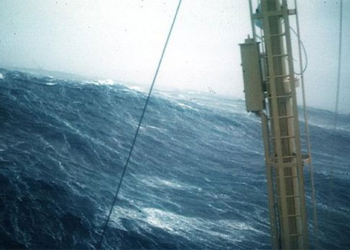Below the stunning and mysterious deep sea, whale sharks reign at the top of the food chain, often referred to as the lords of the ocean. However, introducing these magnificent creatures into aquariums is not an easy task.
Challenges of Keeping Whale Sharks in Aquariums
In recent years, as people have become increasingly interested in marine life, aquariums have emerged as important venues for learning about and interacting with ocean creatures. Whale sharks are among the most captivating marine animals in aquariums. However, keeping whale sharks in aquariums is no easy feat, especially when it comes to providing suitable swimming space.
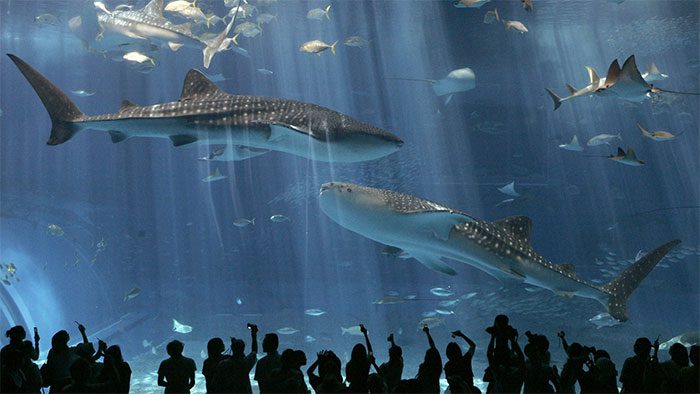
Whale sharks are colossal creatures of the ocean, swimming freely in the sea, showcasing their strength and size. However, keeping whale sharks in aquariums can be an extremely challenging task. To replicate their natural ocean environment, aquariums must consider the living habits, dietary needs, and behavioral patterns of whale sharks. (Image: CNN).
Whale sharks are among the largest animals in the ocean. They typically require vast expanses of water to swim and maintain their natural living conditions. However, aquarium space is often limited, especially in urban areas. This poses significant challenges for keeping whale sharks. To address this issue, aquariums need to plan and design a spacious swimming area in advance to ensure that whale sharks have enough room to swim and to mimic their natural behaviors as closely as possible.
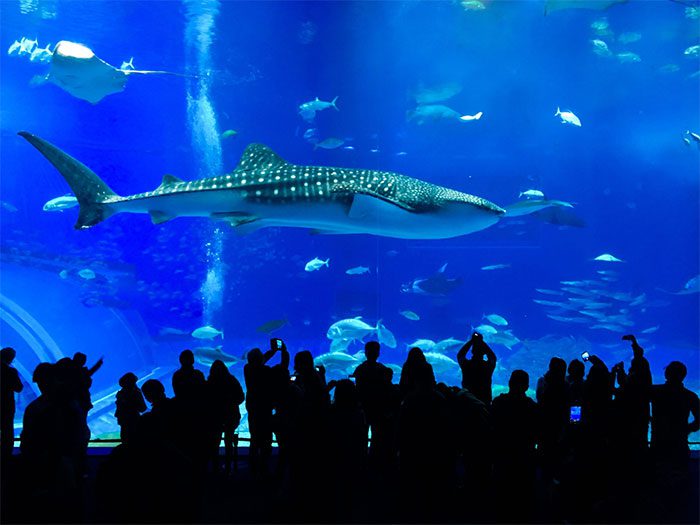
Whale sharks need a sufficiently large space for free swimming. In their natural ocean environment, whale sharks can swim thousands of miles in pursuit of prey. Aquariums need to provide a spacious tank that caters to the active needs of whale sharks. The aquarium should also simulate ocean currents and tides so that whale sharks can feel the rhythm of the natural ocean. (Image: ZME)
Aquariums must also consider the depth and temperature requirements to accommodate whale sharks. Different species of whale sharks have varying adaptation requirements to these environmental factors. To meet their needs, aquariums must be equipped with advanced water circulation systems and temperature control devices to ensure that water depth and temperature can adapt to the living habits of whale sharks. This requires substantial investment and technical support to implement.
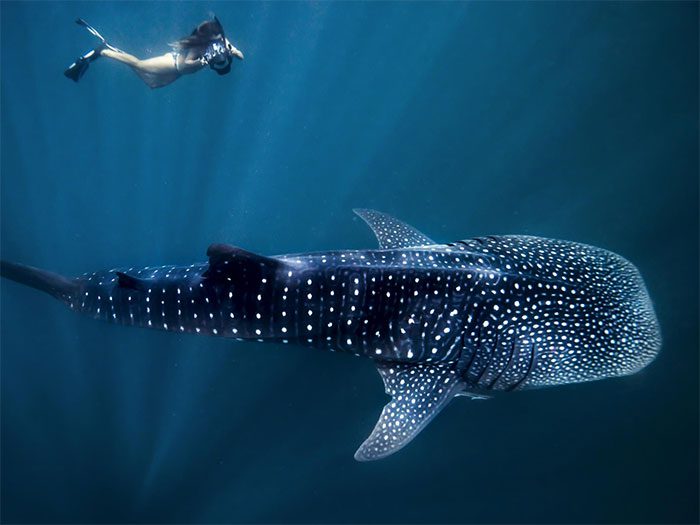
In their natural environment, whale sharks primarily eat fish and other marine creatures. Aquariums should provide a variety of food to meet the nutritional needs of whale sharks. This means that aquariums need to collaborate with fishing vessels and other resources to ensure they can supply whale sharks with fresh and abundant food. (Image: ZME).
Aquariums also need to consider the dietary needs of whale sharks. Whale sharks are carnivorous and require a large amount of food to survive and thrive. In an aquarium setting, providing a diverse and high-quality diet is also a significant challenge. Aquariums need to work with suppliers to ensure that the diet of whale sharks meets their nutritional requirements, and they also need to regularly monitor their feeding to ensure they are developing healthily.
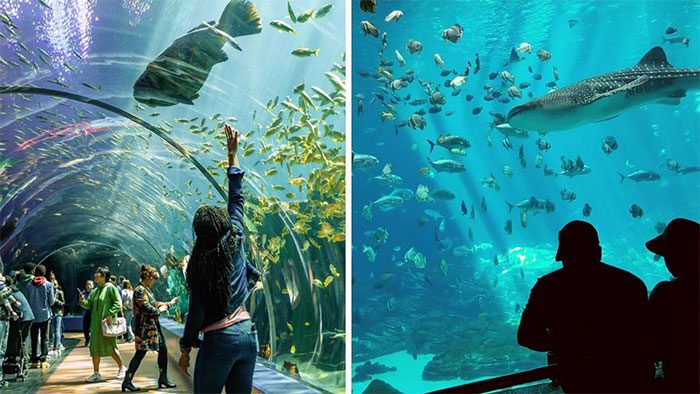
Besides dietary needs, aquariums also need to focus on the behavioral patterns of whale sharks. How to keep whale sharks healthy and exhibiting natural behaviors in a limited space is an important question. Aquariums must provide an appropriate environment for whale sharks to swim and dive, as well as offer various stimuli, such as swimming balls and other play equipment, to keep them active. (Image: Zhihu).
The behavioral and psychological needs of whale sharks are also crucial factors to consider and address. In the wild, whale sharks have the freedom to swim and explore in search of food and mates. However, the environment within an aquarium is relatively closed, requiring aquariums to provide multiple environmental stimuli, including underwater landscapes and social interactions, to meet the behavioral and psychological needs of whale sharks.
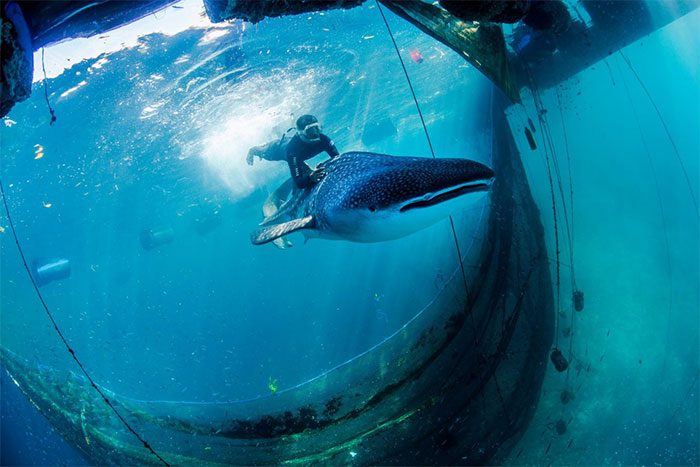
Maintaining clean and clear water is also an important aspect of simulating the natural marine environment. Aquariums need to regularly test water quality and take steps to keep the pool clean and clear. Balanced water quality helps keep whale sharks healthy and creates a more realistic ocean environment. (Image: ZME).
Reasons Whale Sharks in Aquariums Die Prematurely
Whale sharks are kept in aquariums to provide visitors with thrilling experiences watching them, but in recent years, the phenomenon of premature whale shark deaths in aquariums has garnered widespread attention. One of the main reasons is the physiological maladaptation of whale sharks in aquarium settings.
Whale sharks are enormous marine mammals, with physiological structures and behaviors that are highly adapted to the vast ocean environment, such as swimming ability, body temperature regulation, and feeding habits. However, in aquariums, the physiological adaptability of whale sharks is challenged due to environmental limitations.
In aquariums, the swimming space for whale sharks is restricted to a relatively small tank that cannot meet their need for free swimming in the ocean. Being in this limited environment for extended periods has inhibited the muscle development of whale sharks, affecting their mobility and adaptability to marine environments.
Whale sharks can regulate their body temperature in the ocean through special structures on their body surface. However, in an aquarium, it is impossible to provide water temperature, water pressure, and other conditions similar to those in the ocean, which limits the whale sharks’ ability to regulate their body temperature, leading to abnormal body temperatures that can jeopardize their life and health.
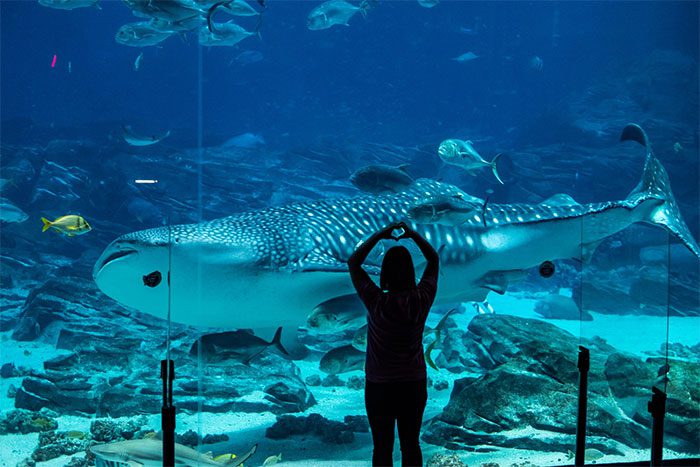
To address the issue of whale sharks’ insufficient physiological adaptability in aquariums, facilities should modify the living environments of whale sharks to provide them with larger swimming spaces to ensure their muscle development and mobility. (Image: Zhihu).
In aquarium settings, relying solely on provided food leads to a diversity and quantity that cannot compare to what they hunt in the wild, resulting in an imbalance in the dietary habits of whale sharks. Over-reliance on human-provided food can lead to malnutrition, which in turn affects the physiological health of whale sharks.
Whale sharks are vital members of the ocean ecosystem, and their premature deaths represent a loss in environmental protection and species conservation efforts. Therefore, aquariums should fully recognize the issue of insufficient physiological adaptability of whale sharks in captivity and take appropriate measures to improve this situation, thereby safeguarding the lives and health of whale sharks while providing visitors with a healthier and more sustainable viewing experience.








































